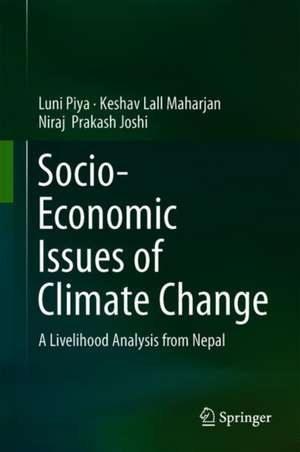Socio-Economic Issues of Climate Change: A Livelihood Analysis from Nepal
Autor Luni Piya, Keshav Lall Maharjan, Niraj Prakash Joshien Limba Engleză Hardback – 5 mar 2019
Preț: 391.61 lei
Nou
Puncte Express: 587
Preț estimativ în valută:
74.94€ • 81.38$ • 62.95£
74.94€ • 81.38$ • 62.95£
Carte tipărită la comandă
Livrare economică 22 aprilie-06 mai
Preluare comenzi: 021 569.72.76
Specificații
ISBN-13: 9789811357831
ISBN-10: 9811357838
Pagini: 240
Ilustrații: XXIV, 202 p. 29 illus., 10 illus. in color.
Dimensiuni: 155 x 235 mm
Greutate: 0.5 kg
Ediția:1st ed. 2019
Editura: Springer Nature Singapore
Colecția Springer
Locul publicării:Singapore, Singapore
ISBN-10: 9811357838
Pagini: 240
Ilustrații: XXIV, 202 p. 29 illus., 10 illus. in color.
Dimensiuni: 155 x 235 mm
Greutate: 0.5 kg
Ediția:1st ed. 2019
Editura: Springer Nature Singapore
Colecția Springer
Locul publicării:Singapore, Singapore
Cuprins
Chapter 1. Introduction.- Chapter 2. Climate change and rural livelihoods in developing countries.- Chapter 3. Climate change in Nepal: Policy and programs.- Chapter 4. Conceptual and analytical framework.- Chapter 5. Chepangs: The community in focus.- Chapter 6. The Study Settings.- Chapter 7. Annual subsistence cycle: Integration of farming and gathering.- Chapter 8. Sources of livelihoods: A portfolio.- Chapter 9. Climate change: Perceptions and the determinants.- Chapter 10. Community vulnerability to climate change.- Chapter 11. Livelihood impacts of climate change and extreme events.- Chapter 12. Adaptation strategies and factors influencing the adaptation choices.- Chapter 13. Conclusion.
Notă biografică
Luni Piya, PhD, Hiroshima University
Keshav Lall Maharjan, PhD, Professor, Hiroshima University
Niraj Prakash Joshi, PhD, Hiroshima University
Keshav Lall Maharjan, PhD, Professor, Hiroshima University
Niraj Prakash Joshi, PhD, Hiroshima University
Textul de pe ultima copertă
This book conducts a holistic analysis of climate change perceptions, vulnerabilities, impacts, and adaptation, based on the primary household-data collected from the Chepang community residing in the rural Mid-Hills of Nepal. Socio-economic and demographic data from the household survey is integrated with meteorological and spatial data to conduct an integrated analysis. Quantitative analysis is also supplemented by qualitative information. Given the context of ongoing climate change, the livelihoods issues of a highly marginalized Chepang community form the center-point of analysis. The book demonstrates that balanced assets possession is a prerequisite to strengthen the adaptive capacity of the households. Furthermore, the ability of translating adaptive capacity into adaptation actions is determined by the households’ ability to correctly perceive the changes and their access to various assets. The book recommends to ensure the availability of non-farm livelihood opportunities along with access to formal/vocational education and skill development training as these are the key factors contributing to reduce the vulnerability. The book concludes that mainstreaming of climate change into development efforts is a must for sustainable development.
Caracteristici
Presents a multidimensional analysis of climate change integrating socio-economic and demographic data with meteorological and spatial data Study conducted at the micro-spatial scale focusing comprehensively on the livelihood issues of a highly marginalized Chepang community residing in the remote rural Mid-Hills of Nepal Combines quantitative and qualitative approaches of data collection and analysis, ensuring the research relevance to multidisciplinary readers
